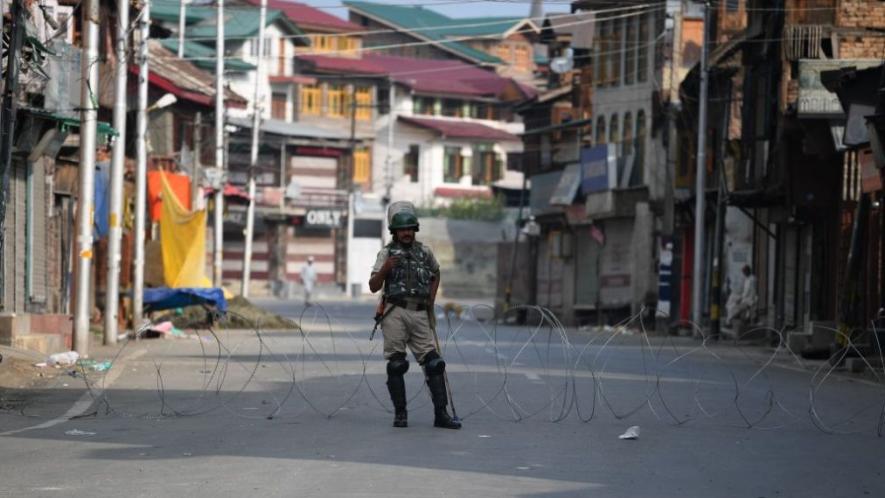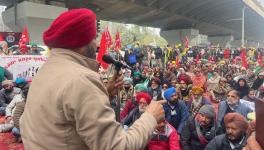A Very Costly ‘Victory’ in Kashmir

Representational image. | Image Courtesy: time.com
Over 50 days after the special status accorded to Jammu and Kashmir (J&K) was revoked I, like many other students, professionals and businessmen of the region, have willy-nilly relocated to mainland India to deal with the pile-up of official work. Our jobs depend on being able to access the internet. And being away from Kashmir during the lockdown now allows us to point out the many ways in which India has set its own Kashmir house on fire.
India has betrayed the promises made by its founding fathers when it revoked the protections of Articles 370 and 35A, all of a sudden, on August 5. By doing so, the ruling Bharatiya Janata Party (BJP)-led National Democratic Alliance (NDA) government has set the stage for the situation in Kashmir to get far worse in future than it has ever been. The deep suspicion that Kashmiris harboured of the Indian State has now been turned into hostility. The prospects for peace have vanished.
By no stretch of the imagination has the issue of Kashmir ceased to matter after the unconstitutional abrogation of special status. In fact, resolution of the Kashmir issue has assumed an urgency it never had before.
Matters are made worse by the fact that a farce was enacted in Parliament to repeal Article 370. This subversion of the Constitution amply demonstrates that peace and coexistence are undesirable to the Indian political establishment, especially the current one. Vast segments of the unconscionably supine Indian media have capitulated to the state propaganda on Kashmir. Those standing on the other side of the fence—those who oppose the summary abrogation of the rights of Kashmiris, those who oppose their being forced to live under a communication lockdown—are fighting a lonely battle, but fighting they are.
Some who support the State, describe the scrapping of Article 370 as part of the BJP’s plans to “socially engineer” the Kashmir valley, or, to alter its demography. They also see the abrogation of the special status in terms of the rich electoral dividends it is expected to pay to the BJP when the country or different states go to the polls. If such logic were indeed sound, then even the Gujarat pogrom of 2002 and the slew of fake encounters that beset the country can be seen as “master-strokes”.
It is not as if India did not already face enough formidable challenges. The shambolic state of the economy, massive corruption, unprecedented unemployment, absence of civic amenities, lack of investment in measures to deal with natural calamities, the spate of crimes against women and weaker sections of society, all continue unabated or are rising by leaps and bounds. It is in this context of overall deterioration of civic life and amenities that the ruling establishment’s pathological obsession and single-minded agenda of chasing imagined enemies—the Kashmiris, Indian Muslims and Pakistan—has to be seen.
The preoccupation with national security and nationalist fervour is pointless when large sections of the population are being held to ransom and living in constant fear of being maimed, lynched or incarcerated. The crimes against minorities and weaker sections are being perpetrated simply because they belong to a different social or religious denomination. Or, those who still speak truth to power are being targeted by a vengeful state’s power.
To someone who holds a ‘moderate’ point of view, the latest push involving Article 370 and Article 35A is a body blow. The marginalised moderate voice in Kashmir, I am afraid, would end up yielding space to maximalists who hold uncompromising and non-negotiable stands on the Kashmir issue.
Like most Kashmiri moderates, I have always seen myself as part of the vast humanity, regardless of my roots, lineage, faith, caste, creed or religion. It is, therefore, deeply saddening for me to witness, as I have in recent times, the countless moderate voices among the Muslims of Kashmir become more conscious of their identity. This self-consciousness has grown ever since the Central government unleashed this unprovoked all-out aggression against Kashmiris.
It is not news for Kashmiris that Muslims and their identity have been facing a growing threat ever since the Hindu Right-wing BJP government took power, first in 2014 and then again in 2019. They have known and suspected this would be the outcome for long. However, now there is no doubt left in the minds of the people of the Valley that the status of Kashmir has been altered exclusively to target their Muslim identity.
The other prong of the Centre’s dubious strategy in Kashmir is to try and insidiously settle outsiders in Kashmir through the abrogation of Article 35A. This is a dangerous and calculated attempt by the government to effect a demographic change in the Valley. The aim is to play low-level politics solely to engineer a favourable outcome in the event of a plebiscite ever being held in Kashmir.
Knowing and feeling the pulse of the place and its people, I am absolutely certain that disturbing the demography of Kashmir so long as it continues to be a disputed territory, is a highly risky affair. The disputed nature of the K-issue remains until it is resolved in accordance with the will of the people the region, as guaranteed under the United Nations (UN) charter on Security Council Resolutions. Some would dismiss these resolutions of the UN as having run their course and having become irrelevant. Would the people who believe this brand of logic apply it to the Holocaust as well?
The entire population of Kashmir has been denied civil liberties and forced to remain indoors with limited access to the essentials, including food, medicine, milk, mobile and internet connectivity for the seventh week running. Leave alone the heavy losses to business and the scores who have lost their lives from want of medical care, the policy pundits have shown how out of touch with ground reality they are when they have touted these harsh measures as a potential trigger for Kashmiris to climb down from their legal, constitutional, historical, cultural and moral rights. The BJP should know that Kashmiris reserve their right to agitate against the barbarities being unleashed upon them by the current political establishment.
Treating the people with absolute contempt and rendering tens of thousands jobless in pursuit of a divisive agenda would soon backfire. This is so obvious that it is most galling and baffling why the BJP and its supporters are taking a ludicrous and unjustified moral high ground on Kashmir. In fact, what needs to be acknowledged is that India has completely lost the plot on the K-issue.
There is no sign that the government is attempting to resolve the deadlock in Kashmir by reaching out to the people of the state through dialogue, discussion and debate. The Centre and the BJP have chosen to remain intransigent by refusing to meet the aggrieved parties halfway. This, do they not understand, shall only complicate matters beyond redemption?
Inspiring fear rather than confidence in a people who are being perceived as the ‘Other’ has been the stock-in-trade of the BJP. This is how it has dealt with any domestic crisis it has faced during its term. When will good sense dawn upon these modern day ‘nation builders’ is anybody’s guess. They need to usher in a new dawn for the battered and brutalised people of India and of the Valley, in particular.
In the light of what has been said above, it becomes evident that Article 370 was revoked from a sense of bilious contempt for the Kashmiri people. Even more poignantly, it is an insatiable thirst to ‘teach Kashmiris a lesson’ that is the trigger for the Centre’s moves since August 5.
The fault of the Kashmiris is that they stood up and asked for their human and democratic rights. Or else, the state of Jammu and Kashmir would not have been singled out for such shabby treatment. This is especially true because a number of other states and their sub-regions have similar protective constitutional provisions, including Gujarat, Maharashtra, Himachal Pradesh, Assam, Nagaland, Manipur and some north-eastern states. None of these other areas have been considered for the same treatment that has been meted out to Jammu and Kashmir.
Last but not least, vast segments of educated Indians have been willing partners in the resurgence of the forces of discord, dissonance and divisiveness in the country. They, I believe, would not escape the judgment which history shall pronounce upon them. They are complicit in the crimes against humanity that are being committed in Kashmir right now by the leaders that they have chosen.
Amin Sofi teaches at Central University of Kashmir, Srinagar. The views are personal.
Get the latest reports & analysis with people's perspective on Protests, movements & deep analytical videos, discussions of the current affairs in your Telegram app. Subscribe to NewsClick's Telegram channel & get Real-Time updates on stories, as they get published on our website.
























